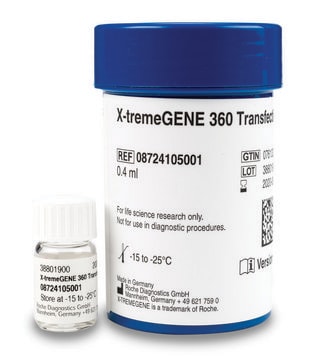EHU063791
MISSION® esiRNA
targeting human LMNA
About This Item
Productos recomendados
description
Powered by Eupheria Biotech
Quality Level
product line
MISSION®
form
lyophilized powder
esiRNA cDNA target sequence
ACCAAGAAGGAGGGTGACCTGATAGCTGCTCAGGCTCGGCTGAAGGACCTGGAGGCTCTGCTGAACTCCAAGGAGGCCGCACTGAGCACTGCTCTCAGTGAGAAGCGCACGCTGGAGGGCGAGCTGCATGATCTGCGGGGCCAGGTGGCCAAGCTTGAGGCAGCCCTAGGTGAGGCCAAGAAGCAACTTCAGGATGAGATGCTGCGGCGGGTGGATGCTGAGAACAGGCTGCAGACCATGAAGGAGGAACTGGACTTCCAGAAGAACATCTACAGTGAGGAGCTGCGTGAGACCAAGCGCCGTCATGAGACCCGACTGGTGGAGATTGACAATGGGAAGCAGCGTGAGTTTGAGAGCCGGCTGGCGGATGCGCTGCAGGAACTGCGGGCCCAGCATGAGGACCAGGTGGAGCAGTA
Ensembl | human accession no.
shipped in
ambient
storage temp.
−20°C
Gene Information
human ... LMNA(4000) , LMNA(4000)
Categorías relacionadas
General description
For additional details as well as to view all available esiRNA options, please visit SigmaAldrich.com/esiRNA.
Legal Information
¿No encuentra el producto adecuado?
Pruebe nuestro Herramienta de selección de productos.
Storage Class
10 - Combustible liquids
flash_point_f
Not applicable
flash_point_c
Not applicable
Elija entre una de las versiones más recientes:
¿Ya tiene este producto?
Encuentre la documentación para los productos que ha comprado recientemente en la Biblioteca de documentos.
Nuestro equipo de científicos tiene experiencia en todas las áreas de investigación: Ciencias de la vida, Ciencia de los materiales, Síntesis química, Cromatografía, Analítica y muchas otras.
Póngase en contacto con el Servicio técnico





